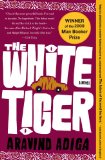Summary | Excerpt | Reading Guide | Reviews | Beyond the Book | Readalikes | Genres & Themes | Author Bio

A Novel
by Aravind Adiga
These are the kinds of gods they have foisted on us, Mr. Jiabao. Understand, now, how hard it is for a man to win his freedom in India.
So much for the place. Now for the people. Your Excellency, I am proud to inform you that Laxmangarh is your typical Indian village paradise, adequately supplied with electricity, running water, and working telephones; and that the children of my village, raised on a nutritious diet of meat, eggs, vegetables, and lentils, will be found, when examined with tape measure and scales, to match up to the minimum height and weight standards set by the United Nations and other organizations whose treaties our prime minister has signed and whose forums he so regularly and pompously attends.
Ha!
Electricity poles -- defunct.
Water tap -- broken.
Children -- too lean and short for their age, and with oversized heads from which vivid eyes shine, like the guilty conscience of the government of India.
Yes, a typical Indian village paradise, Mr. Jiabao. One day I'll have to come to China and see if your village paradises are any better.
Down the middle of the main road, families of hogs are sniffing through sewage -- the upper body of each animal is dry, with long hairs that are matted together into spines; the lower half of the body is peat-black and glistening from sewage. Vivid red and brown flashes of feather -- roosters fly up and down the roofs of the house. Past the hogs and roosters, you'll get to my house -- if it still exists.
At the doorway to my house, you'll see the most important member of my family.
The water buffalo.
She was the fattest thing in our family; this was true in every house in the village. All day long, the women fed her and fed her fresh grass; feeding her was the main thing in their lives. All their hopes were concentrated in her fatness, sir. If she gave enough milk, the women could sell some of it, and there might be a little more money at the end of the day. She was a fat, glossy-skinned creature, with a vein the size of a boy's penis sticking out over her hairy snout, and long thick pearly spittle suspended from the edge of her mouth; she sat all day in her own stupendous crap. She was the dictator of our house!
Once you walk into the house, you will see -- if any of them are still living, after what I did -- the women. Working in the courtyard. My aunts and cousins and Kusum, my granny. One of them preparing the meal for the buffalo; one winnowing rice; one squatting down, looking through the scalp of another woman, squeezing the ticks to death between her fingers. Every now and then they stop their work, because it is time to fight. This means throwing metal vessels at one another, or pulling each other's hair, and then making up, by putting kisses on their palms and pressing them to the others' cheeks. At night they sleep together, their legs falling one over the other, like one creature, a millipede.
Men and boys sleep in another corner of the house.
Early morning. The roosters are going mad throughout the village. A hand stirs me awake...I shake my brother Kishan's legs off my tummy, move my cousin Pappu's palm out of my hair, and extricate myself from the sleepers.
"Come, Munna."
My father, calling for me from the door of the house.
I run behind him. We go out of the house and untie the water buffalo from her post. We are taking her for her morning bath -- all the way to the pond beneath the Black Fort.
The Black Fort stands on the crest of a hill overlooking the village. People who have been to other countries have told me that this fort is as beautiful as anything seen in Europe. The Turks, or the Afghans, or the English, or whichever foreigners were then ruling India, must have built the fort centuries ago.
Copyright © 2008 by Aravind Adiga
Your guide toexceptional books
BookBrowse seeks out and recommends the best in contemporary fiction and nonfiction—books that not only engage and entertain but also deepen our understanding of ourselves and the world around us.